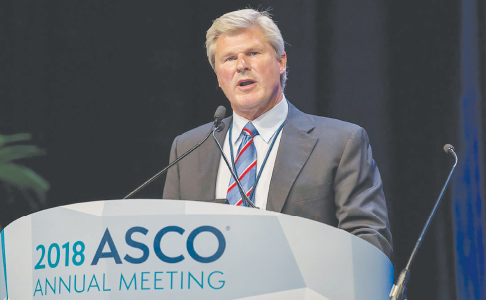ATEZOLIZUMAB (TECENTRIQ) plus bevacizumab (Avastin) plus a platinum doublet (ABCP) improved overall survival by 22% compared with bevacizumab plus a platinum doublet (BCP) in patients with advanced wild-type (without an identified mutation) nonsquamous non–small cell lung cancer (NSCLC), according to the results of the phase III IMpower 150 trial presented at the 2018 ASCO Annual Meeting.1 Interestingly, survival was also improved by the checkpoint inhibitor/vascular endothelial growth factor (VEGF) inhibitor/chemotherapy combination in patients with epidermal growth factor receptor (EGFR) and anaplastic lymphoma kinase (ALK) mutations, as well as in those with liver metastasis. Survival improvement was seen with the four-drug combination irrespective of the programmed cell death ligand 1 (PD-L1) expression level. These study findings were published in The New England Journal of Medicine to coincide with the presentation at the ASCO meeting.2
The median overall survival was 19.2 months for ABCP vs 14.7 months with BCP (P = .0164). The rate of 24-month overall survival was 43% compared with 34%, respectively. The median progression-free survival was also improved by 1.5 months with the four-drug regimen compared with the three-drug regimen: 8.3 months vs 6.98 months, respectively (P < .0001).
These findings represent more evidence of benefit for checkpoint inhibitor/chemotherapy combinations in nonsquamous NSCLC. The phase III KEYNOTE-189 study showed a similar survival benefit for the combination of pembrolizumab (Keytruda) plus chemotherapy in nonsquamous NSCLC.
“The IMpower150 trial met its co-primary endpoints of progression-free and overall survival and demonstrated a statistically significant and clinically meaningful benefit with atezolizumab plus bevacizumab and chemotherapy vs bevacizumab plus chemotherapy alone in the first-line nonsquamous NSCLC setting, across all PD-L1 subgroups. In the landmark analysis, you see an approximate doubling in the 12-month and a tripling in the 18-month progression-free survival rate,” said lead author Mark A. Socinski, MD, Executive Medical Director of the Florida Hospital Cancer Institute, Orlando, Florida.

“In the landmark analysis, you see an approximate doubling in the 12-month and a tripling in the 18-month progression-free survival rate [with atezolizumab, bevacizumab, and chemotherapy].”— Mark A. Socinski, MD
Tweet this quote
For the primary endpoint analysis, patients with EGFR and ALK mutations were excluded. They comprised about 13% of the study participants. When patients with EGFR- or ALK-mutated NSCLC were included in the intent-to-treat analysis, the median overall survival was even higher with ABCP than BCP: 19.8 months vs 14.9 months. Patients with liver metastases also had improved median overall survival with the four-drug regimen over the three-drug regimen (13.2 months vs 9.1 months).
Study Details
THE INTERNATIONAL, open-label IMpower 150 study sought to answer two questions: Does VEGF blockade enhance the efficacy of immunotherapy, and does immunotherapy combine effectively with chemotherapy. The answer to both questions appears to be “yes.”
The study was conducted at 240 sites in 26 countries. Patients with untreated nonsquamous NSCLC (n = 1,202) were randomized to receive atezolizumab plus carboplatin/paclitaxel (ACP), ABCP, or BCP.
The wild-type population comprised 1,040 of the 1,200 patients (86.5%). T effector cell (Teff)-gene signaling in the tumor was evaluated in 95.6% of the patients in the wild-type population. A high Teff gene signature expression was found in 445 patients (42.8%) in the wild-type population.
IMMUNOTHERAPY PLUS CHEMOTHERAPY FOR NONSQUAMOUS LUNG CANCER
- The combination of atezolizumab, bevacizumab, and a platinum doublet (ABCP) improved overall and progression-free survival over bevacizumab and a platinum doublet (BCP) alone as first-line treatment of metastatic nonsquamous non–small cell lung cancer (NSCLC).
- Overall and progression-free survival favored ABCP over BCP in patients with EGFR- and ALK-mutated NSCLC and in those with liver metastases.
- The benefits of ABCP were seen regardless of PD-L1 expression status.
“High Teff gene signature expression—a surrogate marker of PD-L1 expression and preexisting immunity—conferred a greater progression-free survival benefit,” Dr. Socinski said.
Baseline characteristics were well balanced between the treatment groups in the intent-to-treat population, the wild-type population, and the Teff-high wild-type population. About 50% of the intent-to-treat population and the wild-type population had PD-L1–negative tumors. The median age of patients was 63 years; about 55% were younger than age 65; approximately 60% were males; and nearly 80% were current or former smokers.
Progression-Free Survival
PROGRESSION-FREE survival was also longer in the ABCP group than in the BCP group in the overall intent-to-treat population (including those with EGFR or ALK mutations) and among patients with low or negative PD-L1 expression, those with low Teff gene signature expression, and those with liver metastases.
At a median follow-up of 9.5 months, in the wild-type population, the median progression-free survival was longer in the four-drug arm than in the three-drug arm: 8.3 months vs 6.8 months (P < .001). The 6-month rate of progression-free survival was 66.9% in the ABCP group vs 56.1% in the BCP group. Twelve-month progression-free survival rates were 36.5% vs 18%, respectively.
In the Teff-high wild-type population, the median progression-free survival was 11.3 months and 6.8 months, respectively (P < .001). The 6-month rate of progression-free survival was 71.7% in the four-drug group compared with 57% in the three-drug group. The 12-month progression-free survival rate was 46% and 19%, respectively.
In an exploratory analysis, the median progression-free survival was longer with ABCP than with BCP for patients with EGFR or ALK mutations: 9.7 months vs 6.1 months, respectively. In the intent-to-treat analysis (including those with mutations), the median progression-free survival was 8.3 months vs 6.8 months, respectively.
The median progression-free survival was longer with the four-drug regimen than the three-drug regimen in patients with low or negative PD-L1 expression: 8 months vs 6.8 months, respectively. Prolonged progression-free survival was observed with ABCP vs BCP irrespective of PD-L1 status.
“These findings in unselected patients with metastatic NSCLC are particularly relevant because the use of PD-L1 inhibitors as first-line therapy has been limited to patients with high PD-L1 expression, and most patients with metastatic NSCLC have tumors with low, negative, or unknown PD-L1 expression,” Dr. Socinski noted.
Compared with the three-drug regimen, the four-drug regimen improved the median progression-free survival in patients with liver metastases: 7.4 months vs 4.9 months.

Mark A. Socinski, MD, at the 2018 ASCO Annual Meeting. Photo courtesy of Cancer Research Institute.
Safety
THE SAFETY PROFILE was consistent with the known safety risks of the individual agents, including the rate of hemorrhagic events with bevacizumab. “Most adverse events were transient and limited to the chemotherapy induction phase,” he said.
Treatment-related grade 3 or 4 adverse events occurred in 57% of the four-drug arm and 49% of the three-drug arm. Serious adverse events were reported in 44% and 34%, respectively. The most common grade 3 or 4 immune-related adverse events were rash (2% with ABCP and 1% with BCP) and hepatitis (5% and 1%, respectively). “When you look at these two arms, there is no suggestion that adding anti–PD-L1 therapy to anti-VEGF therapy substantially increases the risk of immune-related events,” Dr. Socinski said.
Based on the IMpower 150 data, a supplemental new drug application has been submitted to the U.S. Food and Drug Administration for the ABCP regimen in nonsquamous NSCLC. ■
DISCLOSURE: Dr. Socinski has received honoraria from AstraZeneca, Bristol-Myers Squibb, Celgene, and Genentech; has served as a consultant or advisor to Genentech; has served on the speakers bureau of AstraZeneca, Boehringer Ingelheim, Bristol-Myers Squibb, and Genentech; and has received institutional research funding from Genentech and Pfizer.
REFERENCES
1. Socinski MA, Jotte RM, Cappuzzo F, et al: Overall survival analysis of IMpower 150, a randomized phase 3 study of atezolizumab + chemotherapy ± bevacizumab vs chemo + bevacizumab in 1L nonsquamous NSCLC. 2018 ASCO Annual Meeting. Abstract 9002. Presented June 4, 2018.
2. Socinski MA, Jotte RM, Cappuzzo F, et al: Atezolizumab for first-line treatment of metastatic nonsquamous NSCLC. N Engl J Med 378:2288-2301, 2018.


